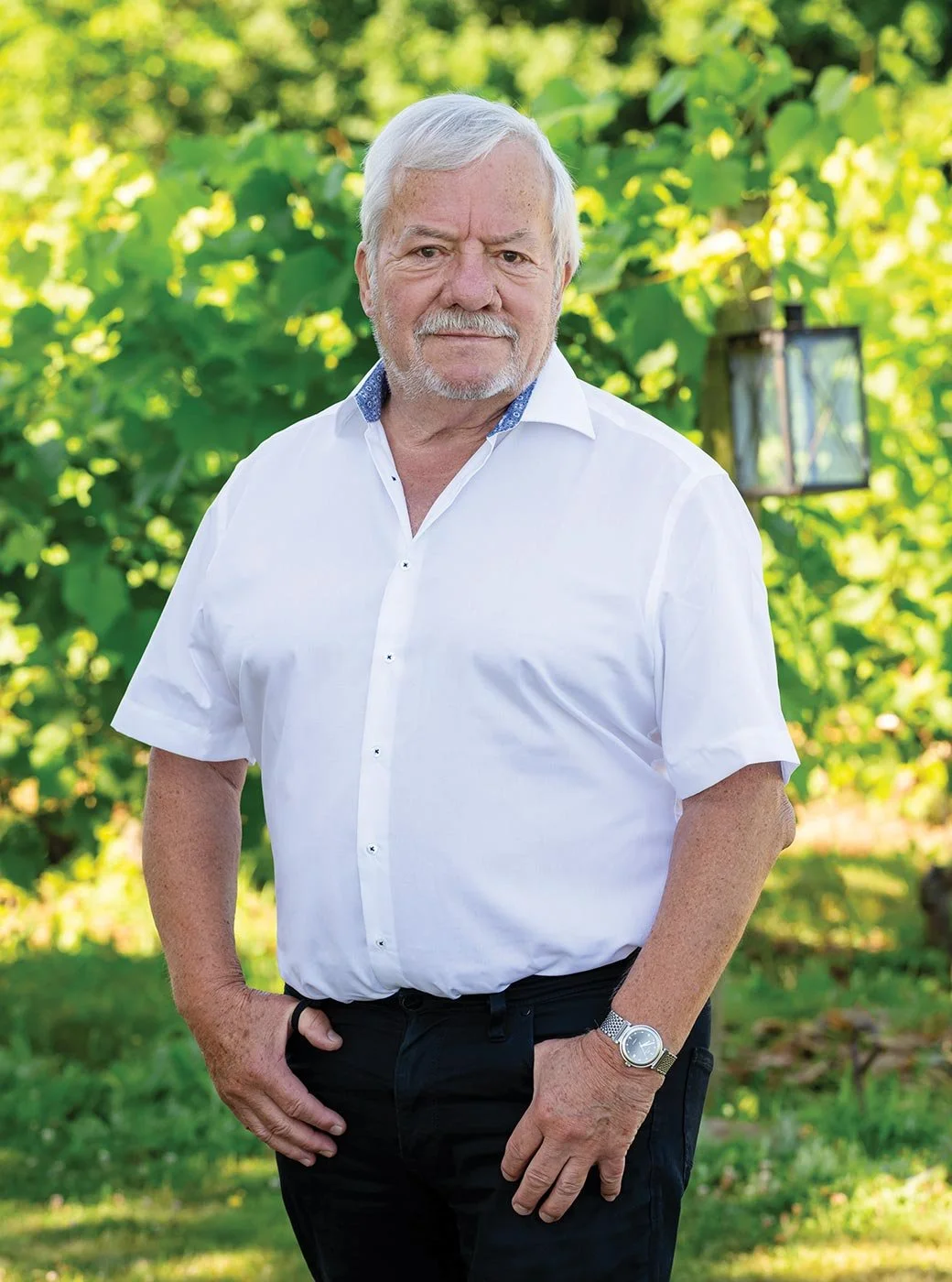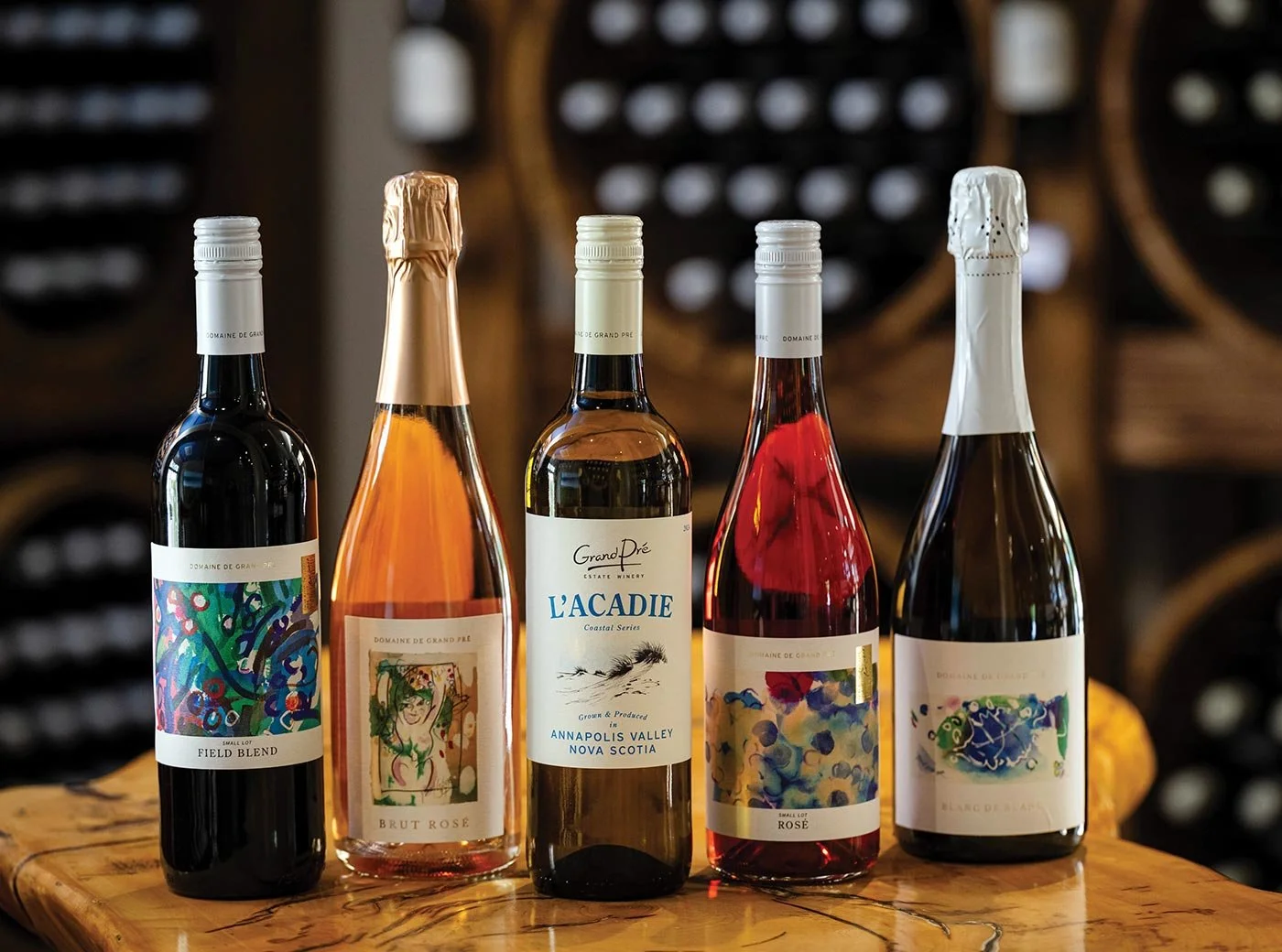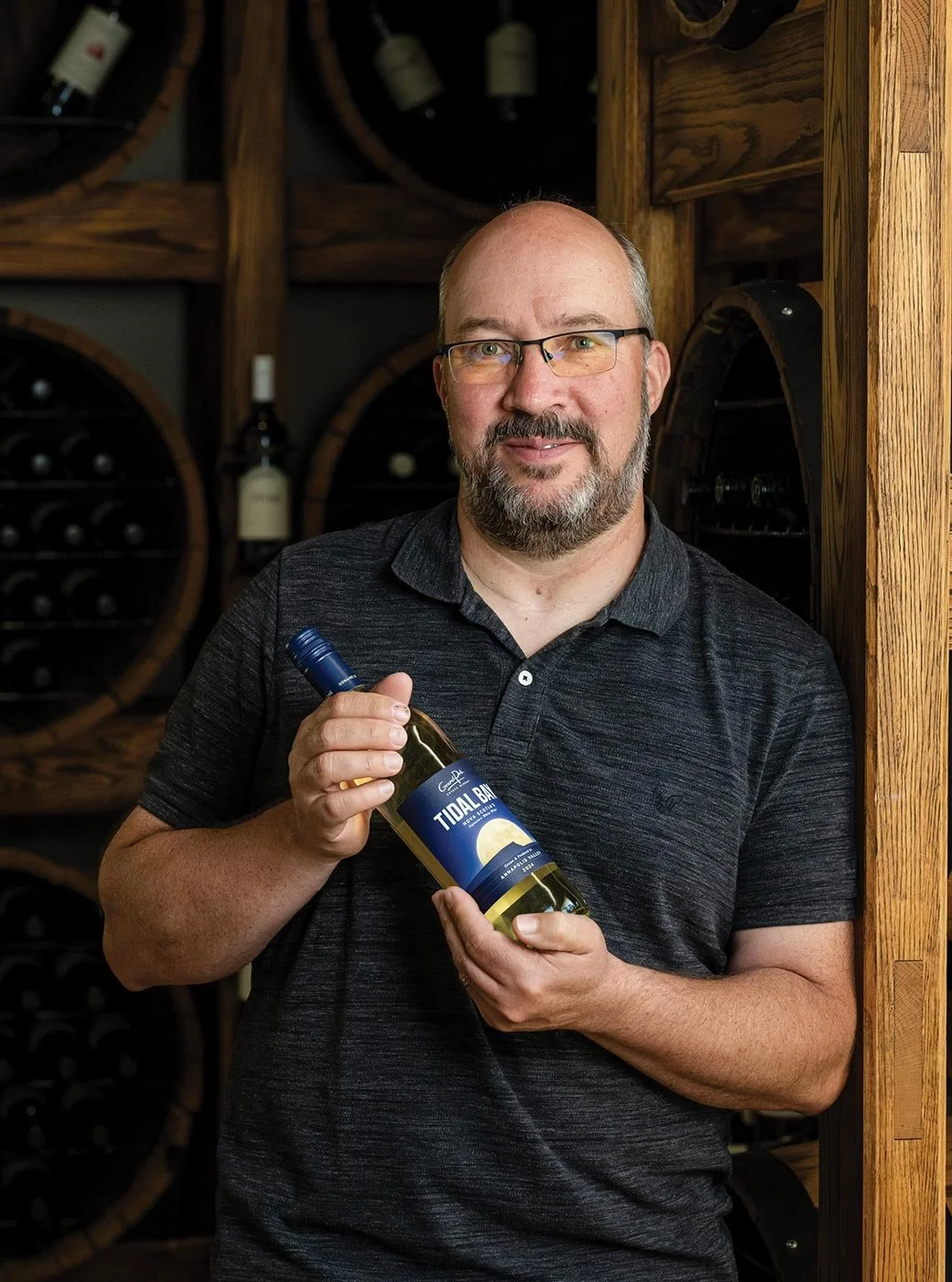Domaine de Grand Pré
25 years of culinary excellence
BY LOLA AUGUSTINE BROWN
PHOTOS MICHELLE DOUCETTE
In 1994, Hanspeter Stutz saw a future for the wine industry in Nova Scotia. We already had “local wine,” but the few wineries here were using imported grape juice (but hey, it was using Nova Scotian water at least). Stutz took a huge gamble and moved his family from Switzerland to carry out his vision and build a winery. Fast forward 25 years, and Nova Scotia wineries produce several multi-award-winning wines, and our province has earned recognition as an international wine region worth travelling to.
Stutz was the catalyst for our wine industry, and he helped a new generation of wineries grow alongside his successful and influential Domaine de Grand Pré. “I knew we could produce truly exceptional wines here,” says Stutz, “And once we started Grand Pré we never looked back.”
Starting something great
When Stutz started in Nova Scotia, his sole goal was to produce truly excellent wine. “At first, there was no intention to build an association and a huge group of owners,” he says. “It was just to prove that we could produce here, and we did.” When Domaine de Grand Pré opened in 2000, it offered a beautiful wine store and restaurant, Le Caveau. The winery became a destination for wine lovers and has helped create a tourism product that attracts more than 150,000 visitors to the province and generates tens of millions in tourism revenue each year. Other wineries followed suit, helping establish a vibrant wine region.
What was key, says Stutz, was people realizing that success comes from “Not just making wine for fun, it's really the education.” That, he says, required outside experts and an openness to learn the techniques that would continue to raise standards.
“This healthy competition helped us all bring each other up to the next level and the next level after that,” explains Stutz. “That’s the beauty; it pushes us all to do better.” Stutz became firm friends with several other winery owners, including Pete Luckett, and finds great pleasure in watching his children and those of other family-run wineries cooperate to keep pushing the industry forward.
Domaine de Grand Pré has always been a family business, and working alongside his children has brought Stutz great pleasure. “It gives me a much easier and more relaxing retirement,” he says. His daughter Beatrice manages the winery, while her husband, acclaimed chef Jason Lynch, helms Le Caveau. Son Jürg is the winemaker, and his wife Cäcilia handles marketing. Jürg’s son just finished the winery and viticulture program at Niagara College, and he is hopeful that he will one day be the future winemaker at Grand Pré. “First, he has to see the world, go to different places. That's the next step. But it's lovely to see that the young people are interested in continuing this,” Stutz says.
Challenges and successes
Not every new winery that opened in Nova Scotia flourished, and Stutz recognizes that for some fledgling winery owners, the business proved tougher than they’d expected. “There was a lot of hype around being a grape grower, and after some time they realized that not only is this a lot of work, it carries a lot of risk,” he explains, “when you do this you’re a farmer, you’re in the agriculture business, and if Mother Nature sends you a crazy early frost like we had four years ago you aren’t going to get any support from the government.”
Those wineries that succeeded worked together to create the Tidal Bay appellation, something that Stutz is incredibly proud of. “When I brought up the idea of creating a signature Nova Scotian wine, I first thought that we should do something on the red side, but it is much more difficult to bring a top red wine to market year after year, and we know that the red wine drinker is much more critical,” he says. “White wine drinkers are much more generous.” In 2012, Tidal Bay was launched and immediately gained popularity—we had our own wine identity that reflected our unique coastal terroir and cooler climate. Thirteen years on, that climate has changed and affected Nova Scotia’s grape growers in several ways.
Living in an unstable environment
As extreme weather events happen more often, there’s a looming threat that anything could happen at any time to affect vine growth or the harvest timeline. Mitigating early frosts and hotter, drier summers is something that needs to be at the forefront of winery owners' minds. However, it isn’t all doom and gloom, says Stutz. While initially wineries here concentrated on crisp whites and ice wines from hybrids and varietals that survived our harsh winters, rising temperatures now allow us to grow almost any grape we want.
Red wines are relatively new to Nova Scotia, but Stutz predicts that as our climate warms, we could be producing much more within the next ten to 15 years. “In the 90s, you could never think about growing pinot noir, chardonnay or riesling, besides this one guy in Bear River who had this unique microclimate, but the window to do this is opening,” Stutz says, “and that is just so interesting for us growers.”
When Jürg started making wines at Grand Pré 20 years ago, he was working with a very different climate. “Now, all of a sudden, we’re growing varieties that we couldn't have imagined 20 or 30 years ago,” he says. But it’s not just about how we can now grow all these old-world varietals.
“At the same time, there is still a lot of grape breeding going on. There are constantly new varietals. For instance, the marquette is one excellent example. I think it's perfect for our climate here in Nova Scotia. It's very winter hardy, and I think that's still the biggest challenge for us, winter hardiness,” Jürg says.
Stutz sees this as a huge opportunity for Nova Scotian wineries as it becomes too hot in traditional European wine regions to grow the grapes that they have depended on for centuries. He thinks that our province is ripe for investment from major French winemakers. “In the Champagne region, temperatures are rising to 45 degrees, and that stops you from being able to produce a top-end Champagne because the grapes' sugar goes through the roof, and we all know that for Champagne, you need some acidity,” he says. Meanwhile, Nova Scotia is growing the right grapes to make champagne—for now—so long as our winters do not get too cold for long periods without sufficient snow cover to insulate the dormant vines.
Jürg says that climate change is bringing challenges and opportunities that require learning techniques and methods to protect the vines. “We have learned to adapt, but extreme events like a late spring frost or a polar vortex aren’t going away. We just have to hope that they don’t happen that often,” he says. At the same time, he notes that these events aren’t unique to Nova Scotia; they’ve been battling late spring frosts in Europe too.
“I’m curious about where it goes from here,” says Jürg. “I can't make any predictions, but I think we do have a bright future. We have this beautiful climate here in Nova Scotia that enables us to make beautiful products from sparkling to crisp white wines and even dessert wines and ice wines. We're in such a lucky position here to do all those things.”
Perfect pairings
Way back when Stutz started Grand Pré, it wasn’t just the wineries here that were lacking—our food scene was pretty dire, aside from a few standout restaurants in Halifax and a few spots outside the city. “The culinary standards here were not good. Each restaurant offered more or less the same menu: you’d get fish with a pile of potatoes or French fries, the same ugly beans and carrots,” he says. “Then we had places like Fleur de Sel open in Lunenburg, and other restaurants all trying to create something. It was the same wave that the wineries were riding, and now we are all so lucky to benefit.”
Le Caveau’s Jason Lynch is one of the chefs who has helped elevate Nova Scotia’s food scene to what it is today, embracing local and seasonal cuisine long before it was trendy. He says that it is wonderful to see chefs and Nova Scotians putting more effort into showcasing and purchasing the amazing products we have right here at home. “Our food scene is truly starting to exhibit a strong sense of place,” Lynch says. “With all the culinary talent we have, combined with our world-class agriculture and beverage products, Nova Scotia's food scene will undoubtedly become even more recognized in the coming years.”
Like with any family business, there are always ups and downs, says Jürg, and it has been a wild ride. “For me, the most satisfying thing has been to be in the midst of seeing the whole industry grow. It's been an amazing journey from that point of view, and it’s not just about the wineries, it’s the distilleries and the cideries too,” he says. “So much has changed here.”
Nova Scotia has evolved significantly over the past 25 years. It now offers an entirely different experience for those devoted to the pleasures of food and wine. Visitors have always sought the province’s natural beauty, but now culinary and wine tourism are two of the biggest tourist draws. Those of us who call Nova Scotia home have benefited dramatically from visionaries like Hanspeter Stutz, who saw what this place could be and worked to make their vision a reality.
Domaine De Grand Pré
11611 Highway 1, Grand Pré
grandprewines.com









